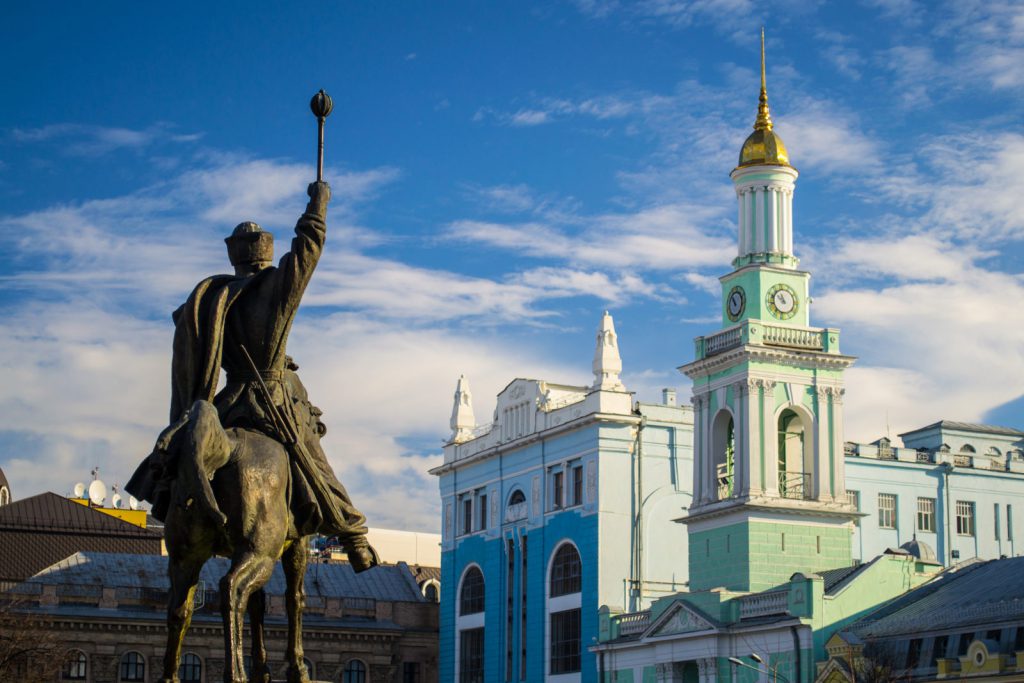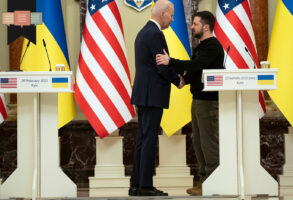
Published September 16, 2016
Ukraine marked the silver anniversary of its independence last month. It has been a rugged 25 years, and the last two and a half have been exceptionally tough. Russia, which has clearly never accepted the fact of an independent Ukrainian state that is not a Muscovite vassal, made a first stab at realizing its imperial ambitions by invading, occupying, and annexing Crimea — in blatant defiance of the Budapest Memorandum (1994), which guaranteed Ukraine’s borders in exchange for its ridding itself of nuclear weapons. Following that reversion to the politics of Anschluss, Moscow and its local minions have conducted, in the Donbass region of eastern Ukraine, a war that has cost almost 10,000 lives while internally displacing 1.5 million people. Occasional bleats notwithstanding, the West has largely stood by during this aggression, even as Ukraine attempts to defend itself while seeing through across-the-board reforms in its legal system, its state bureaucracy, its constitutional arrangements, and its economy.
Yet, somehow, the spirit of the 2013–14 Maidan revolution, which ushered in the present moment in Ukraine’s turbulent history, continues to inspire Ukrainians to do the seemingly impossible: effect a major economic and political transition while fending off military aggression. That may have something to do with three distinctive features of the Maidan revolution — three keys to its success — that will have a lot to do with whether the promise of a free and prosperous Ukraine is realized in the next 25 years.
In a world in which the word “populism” is typically misused, or used in so many different ways as to become virtually meaningless, the Maidan revolution of dignity was a genuinely populist phenomenon: It was a a people’s revolt, in which brave men and women asserted their dignity and rights as citizens, not subjects. And in doing so, they took a giant first step toward exorcising the demon of Homo sovieticus — the thwarted and stunted human personality created by Communism — and putting it behind them. As one brave Ukrainian said during those freezing days in Kyiv when he and thousands of others faced down Russian snipers, “We came to the Maidan looking for Europe” — protesting their government’s decision to back off from an agreement to accelerate accession to the European Union — “and we found Ukraine.” Meaning, I think, that he and tens of thousands of others found themselves as free and responsible agents, protagonists of their own history and destiny, rather than subjects, and often victims, of authoritarian government. That sense of dignity was crucial to the success of the Maidan, and it will be crucial to Ukraine’s future.
Second, in a country too often riven by inter-faith conflict, the Maidan revolution was genuinely ecumenical and inter-religious. People who previously could not imagine themselves working in harness found a new solidarity in living in the truth, and in putting their lives on the line for the truth about their rights as citizens. And out of this may come something of real consequence for the future of those parts of Europe where the Orthodox theological heritage dominates the religious landscape. The new cooperation and conversation between the Ukrainian Greek Catholic Church and those Ukrainian Orthodox communities that have disentangled themselves from the Russian Orthodox Patriarchate of Moscow (a scandalous mouthpiece for the Kremlin on Ukrainian affairs these past several years) may open the path to a development of real consequence in Eastern Christianity: an Orthodox theory of civil society and democracy, including an Orthodox theory of Church and state in which the Church does not function as chaplain to the czar (in whatever guise he appears).
And third, at a moment when the fantastic propaganda apparatus of Vladimir Putin’s Russia was rewriting the history of the eastern Slavs in order to advance a Russian neo-imperial agenda (or, if you prefer, a revanchist KGB agenda), the Maidan asserted the truth of Ukraine’s distinctive cultural heritage, inserted that heritage into the idea of “Europe” in a powerful way that resonated with people of conscience throughout the West, and thereby falsified a Russian expropriation of the entire history of the eastern Slavs: a mythology that has a lot to do with Russians’ own demons, which have been used by Putin in a cynical and sinister way.
What do these three “keys” to the Maidan’s success suggest about the next 25 years?
The genuine populism of the Maidan must now be transformed into the practice of responsible governance — perhaps the hardest of tasks in any democratic transition. Some of those who were Maidan activists have gone into the Ukrainian parliament; others have remained in civil society, working energetically for its ongoing renewal. These two vocational options must be seen as mutually reinforcing. Those who made the revolution but have not gone into government justifiably claim the right to hold Ukraine’s new leadership, which they made possible, accountable to the promises of a radically different Ukrainian future. Those who have gone into government would be well advised to stay in close touch with the base, and with the convictions, that made their new positions possible.
As for the new ecumenical and inter-religious cooperation that was born in the experience of the Maidan, it should be seen as a crucial resource for the future. The fragile but hopeful public moral culture that was born in those epic days and that has been growing ever since is not going to be nurtured by a widespread public enthusiasm for the political philosophy of John Rawls. And it certainly won’t be sustained by any notion that Ukraine must imitate French laïcité in order to be truly democratic. And so the continued conversation and cooperation of the Greek Catholic Church and the non-Moscow-subservient Orthodox Churches, and of the Christian communities with their Jewish and Muslim fellow citizens (the latter being especially crucial in reversing the annexation of Crimea and reintegrating it into a free Ukraine), is going to be essential in the continued strengthening of Ukrainian civil society, and in providing the spiritual and moral resources necessary to resist the temptations to despair that beset all programs of political and social reform — especially one as comprehensive as that required in Ukraine.
And, in the third place, Russia’s false narrative of the history and destiny of the eastern Slavs as one in which all others must resign themselves to living under Muscovite hegemony must be constantly challenged and rebutted, especially in the West. It would be a great help in that task of public mental health if Western political leaders, or wannabe political leaders, would cease and desist from describing Vladimir Putin as a strong leader who gets things done. What Putin has gotten done is to build a kleptocratic Mafia state on top of a crumbling civil society while murdering his opponents with impunity and using an acquiescent Russian Orthodox Church leadership to provide ideological cover for the entire enterprise. This is shameful in itself; it is even more shameful when it is left unanswered and unchallenged by Western political and religious leaders.
The success of Ukraine’s next 25 years might also have a salutary rebound effect in the West. If the West can climb out of the sandbox of self-absorption in which it finds itself, it may find in Ukraine’s struggle to build a free and prosperous future an inspiration to reclaim what is best in the Western political tradition — and in doing so, the West can find one set of tools for countering Putin’s ideological aggression, focused as it is on the West’s alleged decadence.
But this will not happen if Putin succeeds in reducing Ukraine, through chronic low-grade war or something more kinetic and dramatic, into a vassal state. One would have thought that the lessons of leaving such aggression unchecked had been learned in the mid 20th century. When civilizational neighbors who share our commitments to human rights and democracy ask for help in defending themselves, they deserve something more than blankets. The West has a moral as well as strategic responsibility to provide Ukraine with the weaponry it needs to defend itself against various forms of Russian aggression.
And finally: Might I suggest that at least some of the key points here — including the questions “Is Ukraine part of the transatlantic alliance as you understand it?” and “What say ye of Putin?” — be constantly pressed on the two principal candidates for the presidency over the next seven and a half weeks? A failure to do so would be, in a word, deplorable, and a failure to answer forthrightly would brand our would-be leaders as losers.
— George Weigel is Distinguished Senior Fellow of the Ethics and Public Policy Center, where he holds the William E. Simon Chair in Catholic Studies. This article is adapted from remarks delivered on September 14 at a conference at the U.S. Capitol, “Ukraine at 25 — Winning the Battle for Freedom,” organized by the U.S.–Ukraine Foundation.











